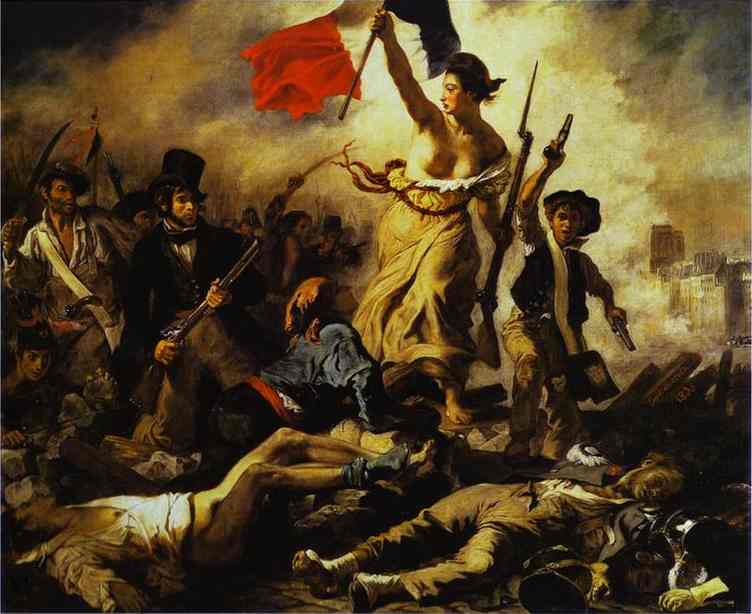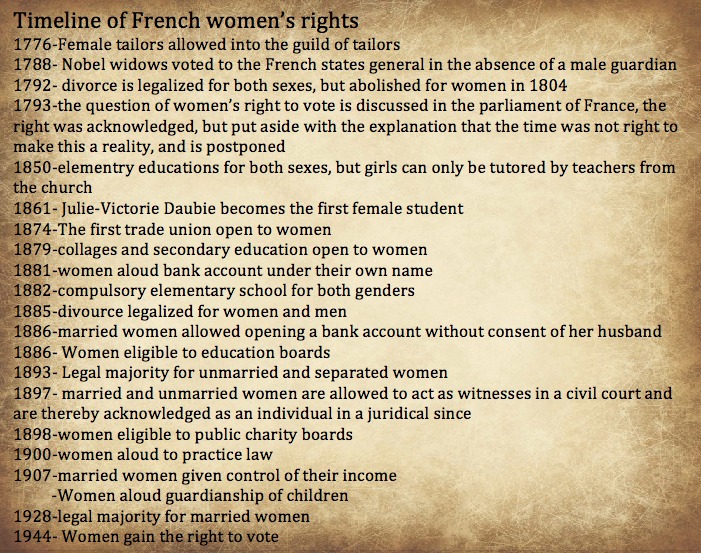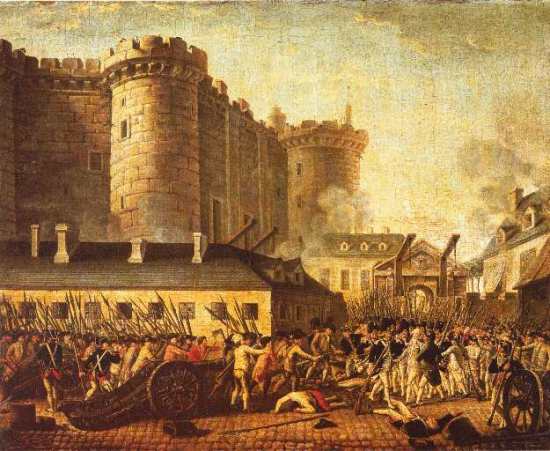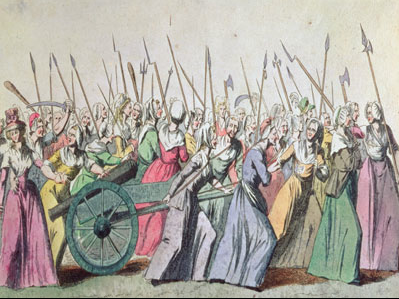Why is the French Revolution important to the development of women’s rights in France?

The phrase “liberty, equality, and fraternity” has become one of the most famous phrases from the French Revolution. But what did this mean for the rights of French women?
Around the time of the French Revolution, women had very few rights—they couldn’t vote, hold any political office, get an education, or sit in on juries. Women were considered passive citizens—they were forced to rely on men to determine what was best for them. Some men thought of women as a “failed man.” Because men were thought to be more “physically fit,” most women stayed home to cook, clean, and care for the children. Some women were shopkeepers, laundresses, or prostitutes. In these days, women were labeled not by their occupation, but by their sex. After the French Revolution, some women worked in coal mines, textile factories, as teachers, lawyers, doctors, merchants, artisans, manufacturers, dancers, secretaries, and clerks.
Life for most people in France in 1789 was very difficult. They had little food and didn’t make much money. Royalty, on the other hand, was living very wealthily, and happily. The king, who didn’t care that people were starving, was continuously raising taxes. Then the price of bread rose, and people had had enough, the men and women started to organize and riot.
During the Revolution, which began in 1789, women participated in many ways. Some demonstrated and rioted over food prices, some joined clubs that were organized by women, and others took part in movements against revolution, ranging from acts of assassination to joining the massive rebellion. Many women began to attend political group meetings, and women and some men were soon impatient for the promise of women’s rights. In 1790, Marie-Jean Caritat, Marquis de Condocet published a newspaper article, in full support of women’s rights. This caused a sensation. In the article, he argued that French women should enjoy equal political rights with men. Soon a group called cercle social (social circle) took shape. In this group were people who supported women’s rights. They launched a campaign for women’s rights in 1790-1791. During this time, they argued for liberal divorce laws and reforms in inheritance laws so that girls and women could inherit property.
The French Revolution lasted about 10 years, ending in 1799. It removed the French monarchy and nobility. French people overthrew the aristocracy and took control, and it changed the economic, political, and social structure of France forever. The short-term benefits included several new governments, the fall of monarchy and class system, and the beginning of democracy and divorce and property laws.
Napoleon Bonaparte was a famous emperor who came into power in 1799, as the French revolution was ending. He took advantage of the weak position France was in, and quickly took control of the government, crowning himself emperor. He demanded that they make him first consulate for life. The French were highly skeptical about him, but he did lead France back to being a great nation. At that time he was exactly what France needed; to bring stability, and rebuild the country, but exactly what the revolutionaries didn’t want. Part of the reason the French Revolution happened was because the people wanted more rights, but Napoleon had no interest in human rights, and they weren’t part of his plans.Instead, his goal for France was to create France in the same mold as the Roman Empire; full of greatness, national pride, territory and colonies.
It was many decades after the French Revolution that women got more rights. Divorce was legalized for women in 1792, but in 1804, this right was abolished by the government, and wasn’t given back until 1885. The French Revolution helped to bring women the right to education. In 1850, it became possible for both sexes to get an elementary education, although girls were allowed only to be tutored by teacher from the church. And finally, in 1879, women were admitted into secondary schools, and collages. In 1944 women were able to vote.
The French Revolution was important to the development of women’s rights in France in many ways: it helped gain women the right to file for divorce, helped to break down the class system, which improved the lives of most women, it helped to bring about education for women, and it eventually helped to bring women the right to vote and inherit property.

Works Cited
Delacroix, Eugène. Liberty Leading the People. 1830. Louvre, Paris.
“French Revolution.” Wikipedia. Wikimedia Foundation, 11 July 2012. Web. 07 Nov. 2012. <http://en.wikipedia.org/wiki/French_Revolution>.
“French Revolution Women.” French Revolution Women. N.p., n.d. Web. 07 Nov. 2012. <http://hypertextopia.com/library/read/1498/9468/6274>.
French, School. Unknown. Unknown. Unknown, Unknown.
Houël, Ean-Pierre. Storming of the Bastille. N.d. Bibliothèque Nationale Française, n.p.
“Liberty Equality, Fraternity: Exploring the French Revolution.” Chapter 5 Page 1. N.p., n.d. Web. 07 Nov. 2012. <http://chnm.gmu.edu/revolution/chap5a.html>.
“Women and the French Revolution.” People.usd.edu. N.p., n.d. Web. <http://people.usd.edu/~clehmann/HWB/hwb_r/Womenrev.html>.


the article is true and contains most vivid information
Just a question– was there one woman who could be considered a guiding force in French Revolution, particularly one who might be tied in with Robbespierre?